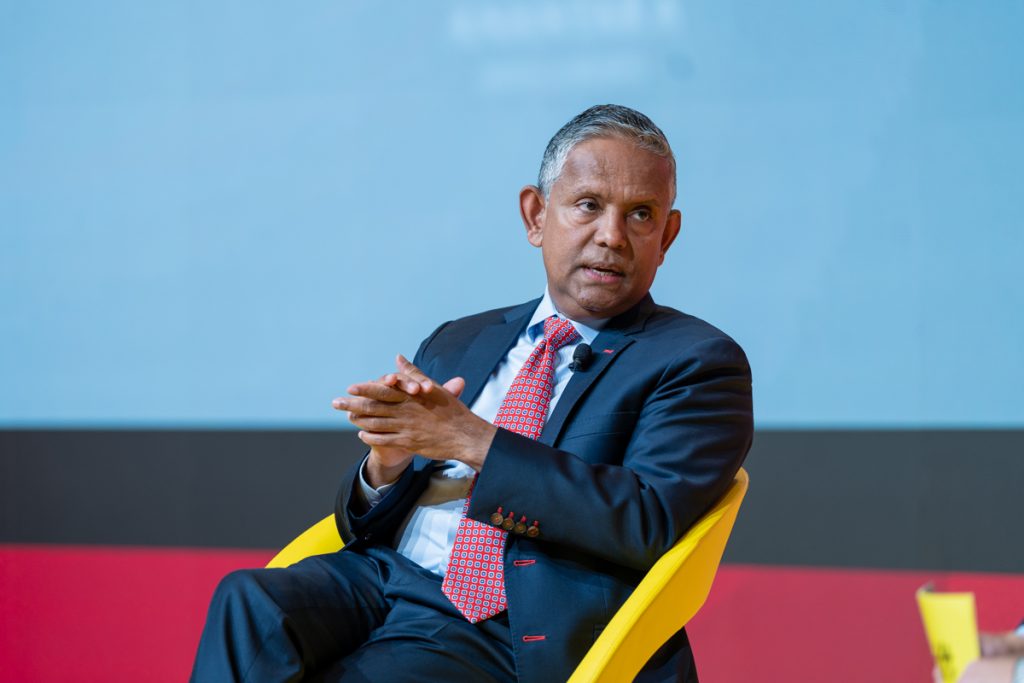Summarize this content to 2000 words in 6 paragraphs
Skift Take
Minor is ready to go major with the launch of a real estate investment trust to drive down debt and supercharge growth.
Josh Corder
Thai hospitality firm Minor International has set its sights on reaching nearly 1,000 hotels in the next five years – almost double its existing portfolio.
“In the next two, three years, or five years, we want to get close to 1,000 hotels,” said Minor International Group CEO Dillip Rajakarier at the Skift Global Forum East in Dubai on Wednesday.
To get there, Minor will use a real estate investment trust, known as a ‘REIT’, into which it will transfer ownership of certain assets. It will then sell shares in the REIT to investors.
“The reason [for the REIT] is that the company has evolved a lot, and creating a REIT, will help us with two things,” said Rajakarier. “One is our debt. We’ve had debt because we acquired NH Hotels in 2018 [for $2.9 billion] and we went through Covid. The other [reason] is growth. The funds will reduce our debt, then we will use the proceeds to help us with our next stage of growth.”
Minor’s chairman Bill Heinecke said on Bloomberg Tuesday that the it could help cut debt in half.
Minor currently has 560 hotels. A third are owned by Minor, another third are managed, and another third are leased, mainly those in Europe. Larger hotel companies like Accor, Hilton and Marriott operate on an asset-light model where the vast majority are managed and very few are owned by the companies themselves.
Minor has another 173 projects under negotiation, including 58 in China and Southeast Asia, 52 in Europe and Latin America, 41 in the Middle East and Africa, and 22 in Australia and New Zealand.
Rajakarier said Minor wants to stay an “owning company.”
“Even if you do a REIT, we will hold at least 55% to make sure we own those assets. The upside you get on your equity return is much higher than a management fee you’d get from hotels. It’s the revenue upside, the asset appreciation. Being an owning company, we will still own the REIT as well.”
“The strategy has a clear plan. We know our growth areas. We’re focusing on how to leverage our relationships. We’re not a management company, we’re an owning company. We own hotels, unlike the others who manage hotels and really believe in fees. We don’t. We have an owner’s mindset and that makes us different.”
Minor Hotels Doesn’t Want to be ‘The Biggest’
Minor’s hotel growth has been rapid. 15 years ago, it had just a dozen properties. It wants to become the next Marriott, but it does want to be the best in the field.
Rajakarier said: “We are the small M. We are not the big Ms of the world, and we don’t aspire to be. It’s not about planting flags and cannibalizing revenue streams. When your owners spend millions of dollars investing, it’s about making sure you are in key, strategic locations. Your brands have to match with the experiences you deliver, and our brands are very segmented.”
Rajakarier highlighted how the Middle East, and specifically the GCC region, is a key component to his ambitious expansion plans. A key driver of that growth will be in Saudi Arabia: The kingdom and Thailand formally normalized diplomatic relations in 2022, after more than three decades of strained ties.
Now, Minor has seven hotels signed in Saudi Arabia, including prestige locations like an Anantara in Neom and Diriyah Gate. In the UAE, Anantara has boomed in popularity, with three properties in Dubai, five in Abu Dhabi and one in Ras Al Khaimah.
The CEO said: “In the GCC, we’ve been fortunate to acquire a very strong footprint. It’s growing too, with more hotels to come. That’s going to be the next stage of growth. Today, coming from Thailand, we’re seeing a lot of Saudis coming to us. We saw a big spike in terms of Saudi tourism. We’re booming.”
“Our growth plans in the Middle East are very strong. Dubai, Abu Dhabi, Sharjah, Oman, Saudi Arabia. What we like about the GCC, the good thing, is you have leaders who are going to be here forever. They are going to lead the country and they are passionate about making the country prosperous. That’s unlike Europe where governments come and go, making it difficult to implement strategies. GCC leaders are focused on elevating the standards.”
Accommodations Sector Stock Index Performance Year-to-Date
What am I looking at? The performance of hotels and short-term rental sector stocks within the ST200. The index includes companies publicly traded across global markets, including international and regional hotel brands, hotel REITs, hotel management companies, alternative accommodations, and timeshares.
The Skift Travel 200 (ST200) combines the financial performance of nearly 200 travel companies worth more than a trillion dollars into a single number. See more hotels and short-term rental financial sector performance.
Read the full methodology behind the Skift Travel 200.


